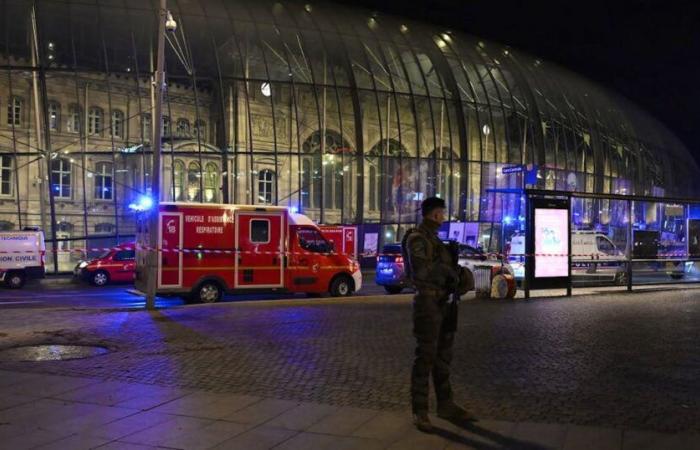The train which caused the tram accident which left 68 injured on Saturday in Strasbourg did not have a safety system preventing it from going backwards. But the origin of the malfunction still remains unknown.
KEYSTONE
“The train which came down was not equipped, it is a train which dates from the 2000s, and this system did not exist at the time”, declared Monday on Ici Alsace the general director of the Compagnie des transports Strasbourg (CTS), Emmanuel Auneau.
However, “it is fully compliant and approved to circulate on the network,” he said. The more recent trainsets supplied by the manufacturer Alstom are equipped with this device, he explained.
The tram, stopped on an upward slope at the exit of Strasbourg station due to a traffic jam caused by a demonstration, “had to leave again and do a sort of start uphill, which it did not succeed in doing », Detailed the director.
The train then went backwards and violently hit the one following it, stopped at the platform at the underground station of Strasbourg station.
“Nothing worked”
But investigators have not yet established why the train went backwards, and why the driver was not able to stop it. There was no referral problem, said Emmanuel Auneau.
“Neither the emergency brakes nor anything worked, so we have a lot of difficulty understanding what happened,” the president of the CTS, Patrick Maciejewski, told AFP.
The driver of the train went back, physically unharmed but very shocked, has not yet been able to provide details on the circumstances of the accident to her superiors or to investigators, he added.
The driver of the struck train was able to leave the hospital Monday morning, while the CTS set up a psychological unit.
Two investigations
Two investigations are underway: one, judicial, for involuntary injuries, aims to establish possible criminal responsibilities; the other, technical, aims to understand how the accident occurred.
In this second investigation, experts from the State Land Transport Accident Investigation Bureau (BEATT) “are looking at all the traces that there may be on the rails, on the installations, to try to understand exactly what which happened,” explained Emmanuel Auneau.
“And then secondly, they will analyze all the technical data that was recorded by the tram – we call it a black box – to find out if the brakes worked well, if the driver pressed which button at what time , how the train behaved.”
The videos recorded by the video surveillance cameras were also recorded by the investigators, said Patrick Maciejewski.
Traffic disrupted for several days
Only investigators currently have access to the station where the accident took place, casting doubt on the date on which tram traffic will be able to resume in the tunnel. But it should remain disrupted at least “until the end of the week,” declared Emmanuel Auneau.
“We need the experts, the authorities, to authorize us to enter the tunnel and extract the trains, and then we will have to check the entire tunnel to know if everything is safe to be able to resume traffic .”
Monday evening, the CTS indicated in a press release that it had received authorization allowing it to begin operations to extract the trains.
Technicians must present what they know to management and staff representatives on Tuesday morning during a social and economic committee (CSE).
Strasbourg is one of the first large French cities to have put a tram network back into service, in 1994, and had already experienced an accident, in exactly the same place, at the end of October 1998. A tram had already collided with another in the tunnel under the station, an accident, due to excessive speed of one of the two trains, which left 17 injured.






